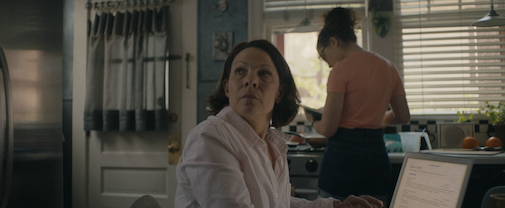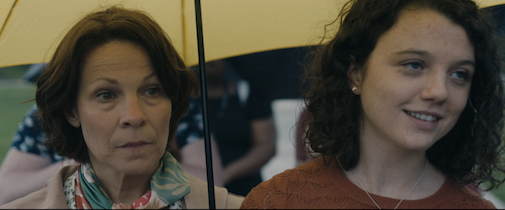
by Nick Taylor
With the 2021 Gotham Awards winners being announced at the end of the month, we thought it’d be fun to highlight a handful of nominated films that could use some attention. It’s always worthwhile to sort through that exclusive group of widely available, barely distributed, minimally buzzed films hiding between the noteworthy early releases and the awards players that won’t legally exist to the moviegoing public for a few more weeks. Inon Stampanier’s Paper Spiders, which earned an Outstanding Lead Performance nomination for Lili Taylor, falls safely into this lucky group. So, to start with a good film that deserves a moment in the spotlight, and as tribute to all the Lili Taylor gays out there (ie, gays I know who can’t stop watching The Conjuring), we begin our little tour here!
Paper Spiders - a title that won’t make any sense until the last few minutes - centers itself on the relationship between college-bound high school senior Melanie (Stefania Owen) and her mother Dawn (Lili Taylor)...
They have a tremendously loving, friendly relationship, one that’s emboldened but also a bit tested by the death of the father/husband two years earlier. Melanie’s about to go to college, which Dawn would like a lot better if her daughter wasn’t so interested in studying halfway across the country. On top of this, their new neighbor’s moving truck accidentally carves a hard line into one of their trees and cusses Dawn out when she confronts him about it offscreen. Soon after the man starts throwing rocks at Dawn while she’s in her backyard and on their rooftop at night. Dawn takes out a restraining order against him to start, and will eventually claim that the man, who’s an electrical engineer, has invented a machine that’s giving her massively painful headaches whenever his sick heart desires. The stress quickly impacts Dawn's relationship with her daughter, her performance at work, and her nascent romantic life.
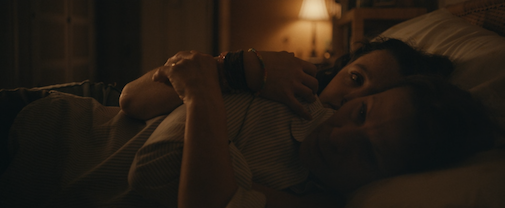
Melanie is rightly very worried about her mom. Dawn’s paranoid behavior is frightening and very, very new to Melanie, who’s dealing with her own anxieties about leaving home and processing her father’s deal. Her worries are further compounded once she realizes that the neighbor’s rocks and shuffling footsteps are most likely pine cones falling from their tree and tiles sliding off the roof. In fact, Melanie learns a great deal about how long her mother has been plagued by similar bouts of paranoia, and how badly her perspective is skewed when her fears flare up this badly. Melanie schedules a meeting with a school counselor (Michael Cyril Creighton) who convinces her to try and talk to her mom about her mental health. Dawn brushes off Melanie’s concerns without a second thought. On top of this, Melanie is also dealing with graduating from high school and waiting to hear back from the colleges she applied to, though these issues largely take a narrative backseat as she decides whether or not to get involved with a boy (Ian Nelson) whose worst impulses threaten to overwhelm his genuine interest in her.
I was a bit surprised to learn that Paper Spiders was released as a TV movie, even earning a TV-MA rating rather than going through the MPAA. Sure, there isn’t much visual flair here (although I’m not sure the film is demanding to be more overtly cinematic), but compared to the occasional sins of overlighting in Mass or the unforgivingly Hallmark-y feel of CODA, Paper Spiders boasts a fairly sturdy aesthetic strategy, neither amping up color for melodramatic purposes or gratuitously desaturating everything for faux-seriousness. Stampanier isn’t trying anything new with image-making or sound design, but Paper Spiders never looks cheap or gets in its own way, and it knows how to spike a scene when it shifts to Dawn’s perspective so we can better understand how her illness is affecting her perspective. The stability of its style, even as both women feel their worlds palpably shift in new, unwelcome directions, is an effective contrast.
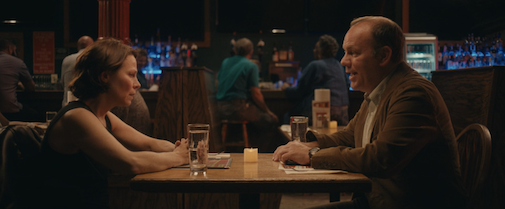
Stability in general is one of Paper Spiders’s best assets. It holds itself to being a credible straightforward drama about living with mental illness, and about coming to terms with a loved one’s mental illness, be that accepting them for who they are or throwing them to the curb. Dawn and Melanie are both fully realized protagonists, and though the film is unambiguously in favor of Dawn getting the treatment she needs, both women are never vilified or martyred for their actions. We’re allowed to react to them as complex figures without being prescribed to view them as right or wrong, good or bad. A handful of overtly comedic characters indicate how badly a more sitcommy take on this story would’ve been. There’s plenty of jokes, but they work best when they’re submerged underneath a deadpan attitude rather than actively played for laughs. It’s also a pleasant surprise to realize that Melanie’s high school drama is as engaging as her mother’s downward spiral, though Owen certainly isn’t on Taylor’s level as an actress. Again, it’s not a challenging film, but it holds to its own tasks without stumbling much. Even if some scenes ring false or undernourished as written, everything moves as it should.
So, we have a good movie that’s sturdier than you’d expect, with some strengths that are easy to take for granted and some forgivable lapses. Lili Taylor’s performance maintains the consistency of tone and storytelling that define what works best in Paper Spiders while tapering over any issues that might be hiding in the script. From her first scene, attending a college tour with her daughter and dissing the school while quizzing the tour guide on campus crime rates, she’s instantly recognizable as a certain kind of acerbic, whip smart, ultimately caring mother. Taylor's bond with Owen is wonderful, and both actresses do great work in their scenes together.
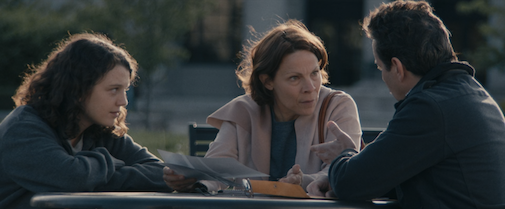
There are so many ways for Dawn to get reduced to a cheap acting showcase - ratcheting up her neuroses as the story escalates, amping up comedy or performative behavior, adding undue glimpses of self-awareness to her destructive behavior. Taylor avoids all of this, playing each scene like it’s the most logical choice her character would make, with an added layer of exasperation at having to explain herself when her actions are so obvious. Her paranoid delusions aren’t separate from her personality but deeply ingrained in how she interacts with the world, especially when she thinks her demands are not just reasonable but imminently warranted. She carries the whole thing beautifully and honestly, even adding some notes of personal unease in an ending that wants to tie a very nice, very final bow around Dawn's mental illness. She isn't the only bright spot in the cast - Owen and Nelson are quite good, as is Tony Baba as a man who Dawn tries dating - but she's unambiguously best in show.
Taylor's good enough to carry the film through a couple scenes towards the end that might otherwise feel overdetermined. There's a lot of olive branches, a lot of recrimination, a lot of lives settled and upended and settled again. I wouldn't say the ending of Paper Spiders is when it shines, but I'm grateful for what it attempts and the journy to get there. Most of all, I'm glad for Taylor's performance, which gives the film its toughest insights about living with mental illness and a lived-in character to convey those insights, rather than an emblem or a lesson. It's the kind of unshowy, startling, and character-specific acting that deserves more recognition, and I'm so happy her richly deserved Gotham nomination got me to see it.
